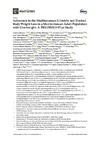Please use this identifier to cite or link to this item:
https://accedacris.ulpgc.es/jspui/handle/10553/73945
| Title: | Adherence to the mediterranean lifestyle and desired body weight loss in a mediterranean adult population with overweight: A predimed‐plus study | Authors: | Bouzas, Cristina Bibiloni, Maria del Mar Julibert, Alicia Ruiz‐Canela, Miguel Salas‐Salvadó, Jordi Corella, Dolores Zomeño, Maria Dolors Romaguera, Dora Vioque, Jesús Alonso‐Gómez, Ángel M. Wärnberg, Julia Alfredo Martínez, J. Serra Majem, Luis Estruch, Ramon Tinahones, Francisco J. Lapetra, José Pintó, Xavier Ríos, Antonio García Bueno‐Cavanillas, Aurora Gaforio, José J. Matía‐Martín, Pilar Daimiel, Lidia Martín‐Sánchez, Vicente Vidal, Josep Vázquez, Clotilde Ros, Emilio Fernandez‐Lázaro, Cesar Ignacio Becerra‐Tomás, Nerea Gimenez‐Alba, Ignacio Manuel Muñoz, Julia Morey, Marga Oncina‐Canovas, Alejandro Tojal‐Sierra, Lucas Pérez‐López, Jéssica Abete, Itziar Casañas‐Quintana, Tamara Castro‐Barquero, Sara Bernal‐López, M. Rosa Santos‐Lozano, José Manuel Galera, Ana Angullo‐Martínez, Escarlata Basterra‐Gortari, F. Javier Basora, Josep Saiz, Carmen Castañer, Olga Martín, Marian Notario‐Barandiarán, Leyre Belló‐Mora, María C. Sayón‐Orea, Carmen García‐Gavilán, Jesús Goday, Albert Tur, Josep A. |
UNESCO Clasification: | 3206 Ciencias de la nutrición | Keywords: | Body Image Desired Weight Loss Ideal Weight Mediterranean Lifestyle Obesity, et al |
Issue Date: | 2020 | Journal: | Nutrients | Abstract: | Body weight dissatisfaction is a hindrance to following a healthy lifestyle and it has been associated with weight concerns. Objectives. The aim of this study was to assess the association between the adherence to the Mediterranean lifestyle (diet and exercise) and the desired body weight loss in an adult Mediterranean population with overweight. Methods. Cross‐sectional analysis in 6355 participants (3268 men; 3087 women) with metabolic syndrome and BMI (Body mass index) between 27.0 and 40.0 kg/m2 (55–75 years old) from the PREDIMED‐Plus trial. Desired weight loss was the percentage of weight that participants wished to lose. It was categorized into four cut‐offs of this percentage (Q1: <10%, n = 1495; Q2: 10–15%, n = 1804; Q3: <15–20%, n = 1470; Q4: ≥20%, n = 1589). Diet was assessed using a validated food frequency questionnaire and a 17‐item Mediterranean diet questionnaire. Physical activity was assessed by the validated Minnesota‐REGICOR and the validated Spanish version of the Nurses’ Health Study questionnaire. Results. Participants reporting higher percentages of desired weight loss (Q3 and Q4) were younger, had higher real and perceived BMI and were more likely to have abdominal obesity. Desired weight loss correlated inversely to physical activity (Q1: 2106 MET min/week; Q4: 1585 MET min/week. p < 0.001) and adherence to Mediterranean diet (Q1: 8.7; Q4: 8.3. p < 0.001). Conclusions. In older Mediterranean individuals with weight excess, desired weight loss was inversely associated with Mediterranean lifestyle adherence. Deeply rooted aspects of the MedDiet remained similar across groups. Longitudinal research is advised to be able to establish causality. | URI: | https://accedacris.ulpgc.es/handle/10553/73945 | ISSN: | 2072-6643 | DOI: | 10.3390/nu12072114 | Source: | Nutrients [EISSN 2072-6643], v. 12 (7), 2114, (Julio 2020) |
| Appears in Collections: | Artículos |
SCOPUSTM
Citations
27
checked on Jun 8, 2025
WEB OF SCIENCETM
Citations
28
checked on Jan 25, 2026
Page view(s)
394
checked on Jan 15, 2026
Download(s)
167
checked on Jan 15, 2026
Google ScholarTM
Check
Altmetric
Share
Export metadata
Items in accedaCRIS are protected by copyright, with all rights reserved, unless otherwise indicated.
